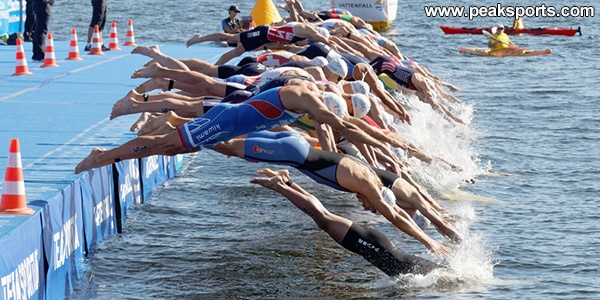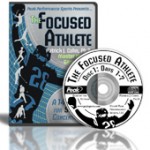
Sources of Motivation for Athletes
Are you (or your athletes) motivated by getting your name in the newspaper? Are you motivated by receiving the MVP award at the end-of-the-year team banquet?
These sources of motivation are referred to as extrinsic motivation. Extrinsic motivation refers to actions that are driven by external rewards such as money, trophies, acclaim, gifts, praise, awards, etc.
While extrinsic rewards can increase motivation initially, over time, the sole use of extrinsic rewards tends to decrease motivation.
When your motivation is dependent upon awards, trophies and accolades, once those rewards are no longer received, motivation will decrease.
For example, let’s look at a young swimmer who gets their name in the newspaper each week and gets first place medals for practically every event repeatedly.
After a while, teammates start beating this swimmer to the point she no longer places in events nor does she receive medals or trophies.
Soon, this swimmer may lose her motivation to keep training five days a week and putting in hours of effort. She may think, “Why even swim if I am not longer winning at meets?”
There is another source of motivation referred to as intrinsic motivation.
Intrinsic motivation is defined as performing an action because you enjoy the sport itself or the challenges of your sport.
Intrinsic sources of motivation include: love of competing, being part of a team, learning new skills, improving your game, flow, having fun, etc.
If you are playing a sport that you are passionate about and find intrinsically rewarding, you are more likely to persist when faced with challenges.
Let’s revisit the example of the swimmer…
If she was primarily motivated by achieving personal bests, after a couple bad races, she might look for new ways to improve her times, such as; work harder in practice, try to improve technique or learn to relax prior to lining up behind the blocks.
A mixture of both sources of motivation, intrinsic and extrinsic, is often the best method to keep an athlete moving forward.
Even professional athletes need to feed their motivation. Los Angeles Lakers power forward Kyle Kuzma uses both intrinsic and extrinsic sources to maintain his motivation and fuel his performance.
Kuzma was selected with the 27th overall pick in the 2017 NBA draft and had a great rookie season. Kuzma was chosen to play in the Rising Stars Challenge during All-Star weekend and he shared his motivation to win.
Each member of the winning team in the Rising Stars receives a $25,000 bonus. That source of extrinsic motivation helped Kuzma score 35 points contributing to Team USA’s victory over Team World.
KUZMA: “I think it was the second timeout, and I broke the huddle by saying, ‘Bonus-1-2-3.’ So there you go.”
But Kuzma also was motivated to improve his performance from last year’s game (intrinsic motivation) and have Team USA take back the title.
KUZMA: “I played last year and was lackadaisical, so I didn’t want to do that again… There was a lot of great players out there, All-Stars, we’re all young rising stars in this league. Obviously it’s an exhibition, but it’s always better to have bragging rights whenever you can.”
Motivation helps you persist through challenges, rise to the occasion when necessary and achieve more of your potential.
By feeding yourself a daily dose of motivation, you can become the athlete you want to become.
Tap into Your Motivation:
Think of sources of intrinsic and extrinsic rewards that best fuel your motivation and commitment.
Remind yourself why you are passionate about your sport. What do you enjoy about practice and competition?
Why do you do what you do? What’s the end game with your participation in sports?
Playing to make others happy is not a good reason to compete. Participating because you don’t know what else to do is also not a good reason.
Knowing what motivates you will help you continue to excel and reach your goals.
If you’re an athlete who is frequently distracted, loses focus in competition, or wants to learn more about how to focus better under pressure, read more about The Focused Athlete…
Related Sports Psychology Articles
- How to Turn Negative Criticism into Motivation
- What’s The Best Motivation For Athletes?
- Sports Psychology Podcast: Confidence and Motivation After Setbacks
*Subscribe to The Sports Psychology Podcast on iTunes
*Subscribe to The Sports Psychology Podcast on Spotify
Download a free sports psychology report to improve your mental game!
Learn more about our one-on-one mental game coaching.
The Focused Athlete

It’s probably no secret that you have many opportunities to become distracted in sports. Athletes are bombarded with both internal and external distractions everyday in practice and competition. Focused athletes are able to get the most from their skills because they are more efficient with practice and more concentrated in competition. Athletes who lack focus let distractions run wild through their mind and don’t know how to adjust or refocus.
The Focused Athlete was developed for any level coach, parent, or junior to professional athlete who wants to improve performance and gain a competitive edge. It does not matter if you are a fledgling junior athlete; or a seasoned professional, plagued with distractions; or you just wanting to learn how to improve concentration…
“The Focused Athlete” is a complete system to teach you how to focus like a champion and harness the power of a zone focus every time you step on the playing field, court, track, or course in practice and games!
